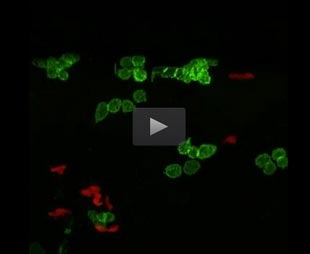Live imaging reveals how wound healing influences cancer

The neutrophils (red) swarm around nearby precancerous cells (green) where they trigger cell division and progression of melanoma. Courtesy of Paul Martin, University of Bristol
“Our results provide direct visual evidence of a physical link between wound-associated inflammation and the development of skin cancer,” says EMBO Member Paul Martin, professor at Bristol University and the University of Cardiff.
“White blood cells, in particular neutrophils, that typically serve as part of the body's built-in immune system are usurped by nearby precancerous skin cells in a way that leads to the proliferation of tumour cells in our zebrafish model experimental system of human melanoma.”
Scientists have known for some time that inflammation is one of the ten hallmarks of cancer. Cancer has also been described as a “wound that does not heal.” However details about how physical damage to body tissues might influence the progress of cancer have remained scarce.
The researchers used genetically modified larvae of zebrafish to watch the relationship between wound-associated inflammation and melanoma as the cancer took hold in the living fish. The cellular events and changes were observed by live imaging with a special confocal laser-scanning microscope.
In further experiments, the researchers were also able to show that a specific type of signaling molecule released by neutrophils, prostaglandin E2, is part of the signal that drives the splurge of cell growth linked to the cancer in their experimental system.
High levels of neutrophils were also detected in human clinical samples of melanomas that had been obtained from individuals whose cancers had open ulcers. Importantly, neutrophils were linked to increased proliferation of melanoma cells and poor survival, which suggests that these findings in fish may have considerable relevance to cancer patients.
The authors note that the findings of the study may have implications for cancer surgery. Minimally invasive surgery is beneficial to cancer patients in many situations and often the preferred treatment. However, particularly in cases where all cancerous tissue cannot be removed, the inflammatory response might influence the remaining cancer cells in the body.
“Our studies to date suggest that several strategies might improve outcomes for patients including the possible use of therapeutics to dampen damage-induced inflammatory responses,” adds Martin.
Further work is in progress to better understand the relationship between the inflammatory response and skin cancer in the zebrafish model system. Studies are also needed to investigate what therapeutic or other strategies might bring better interventions for patients who have adverse tissue inflammation due to planned (for example biopsy or surgery) or unplanned (e.g. ulceration) tissue damage.
###
The wound inflammatory response exacerbates growth of pre-neoplastic cells and progression to cancer.
Nicole Antonio, Marie Louise Bønnelykke-Behrndtz, Laura Ward, John Collin, Ib Jarle Christensen, Torben Steiniche, Henrik Schmidt, Yi Feng, Paul Martin
The paper will be available at 1200 Central European Time at emboj.embopress.org. Please send an e-mail to barry.whyte@embo.org if you require a copy of the paper during the embargo period.
For further information on The EMBO Journal please consult emboj.embopress.org.
Video: Neutrophils (red) swarm around nearby precancerous cells (green) where they trigger cell division and progression of cancer.
Media contacts:
Barry Whyte
barry.whyte@embo.org
Karin Dumstrei
Karin.dumstrei@embo.org
+49 6221 8891 406
The EMBO Journal
About EMBO
EMBO is an organization of more than 1700 leading researchers that promotes excellence in the life sciences. The major goals of the organization are to support talented researchers at all stages of their careers, stimulate the exchange of scientific information, and help build a European research environment where scientists can achieve their best work.
EMBO helps young scientists to advance their research, promote their international reputations and ensure their mobility. Courses, workshops, conferences and scientific journals disseminate the latest research and offer training in techniques to maintain high standards of excellence in research practice. EMBO helps to shape science and research policy by seeking input and feedback from our community and by following closely the trends in science in Europe.
For more information visit: http://www.
Media Contact
All latest news from the category: Health and Medicine
This subject area encompasses research and studies in the field of human medicine.
Among the wide-ranging list of topics covered here are anesthesiology, anatomy, surgery, human genetics, hygiene and environmental medicine, internal medicine, neurology, pharmacology, physiology, urology and dental medicine.
Newest articles

NASA: Mystery of life’s handedness deepens
The mystery of why life uses molecules with specific orientations has deepened with a NASA-funded discovery that RNA — a key molecule thought to have potentially held the instructions for…

What are the effects of historic lithium mining on water quality?
Study reveals low levels of common contaminants but high levels of other elements in waters associated with an abandoned lithium mine. Lithium ore and mining waste from a historic lithium…

Quantum-inspired design boosts efficiency of heat-to-electricity conversion
Rice engineers take unconventional route to improving thermophotovoltaic systems. Researchers at Rice University have found a new way to improve a key element of thermophotovoltaic (TPV) systems, which convert heat…



